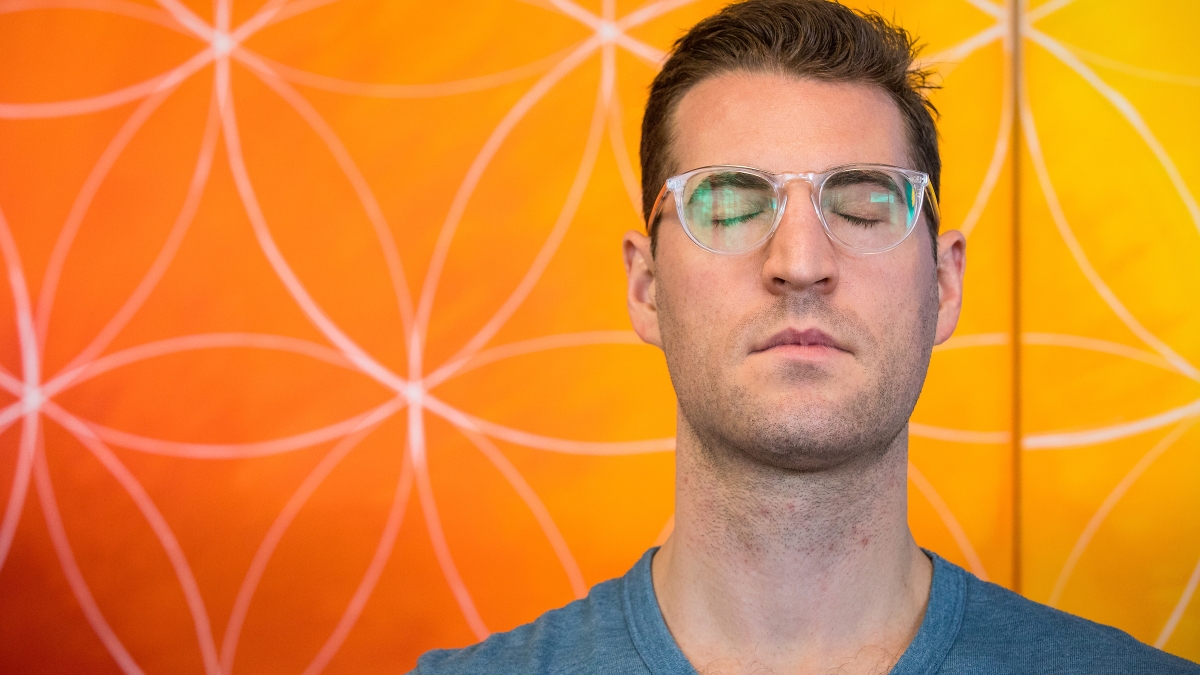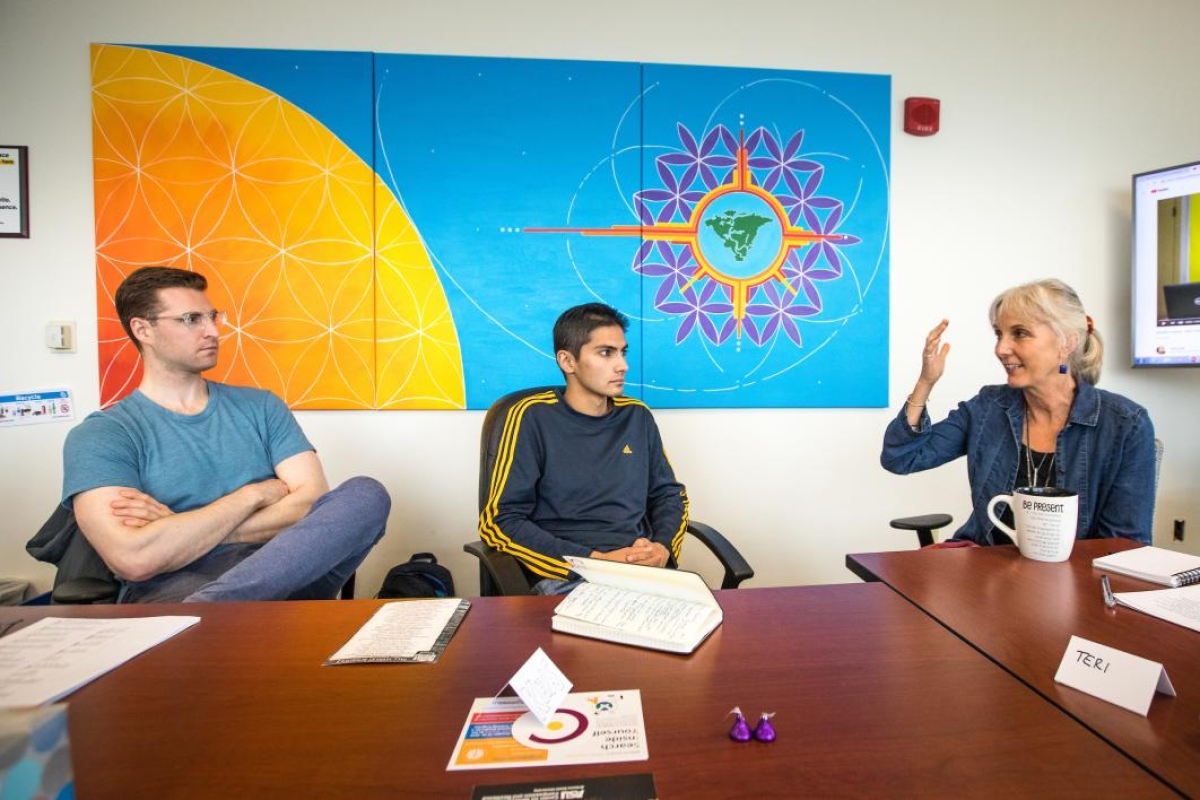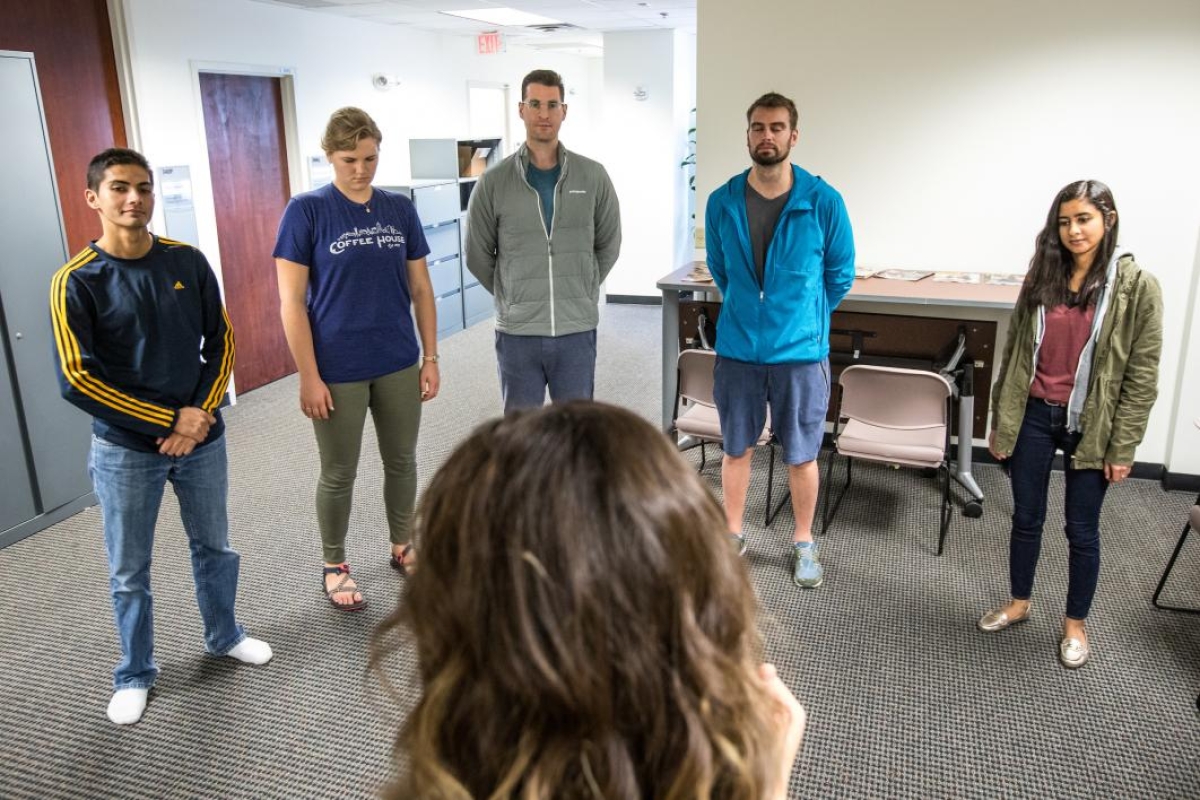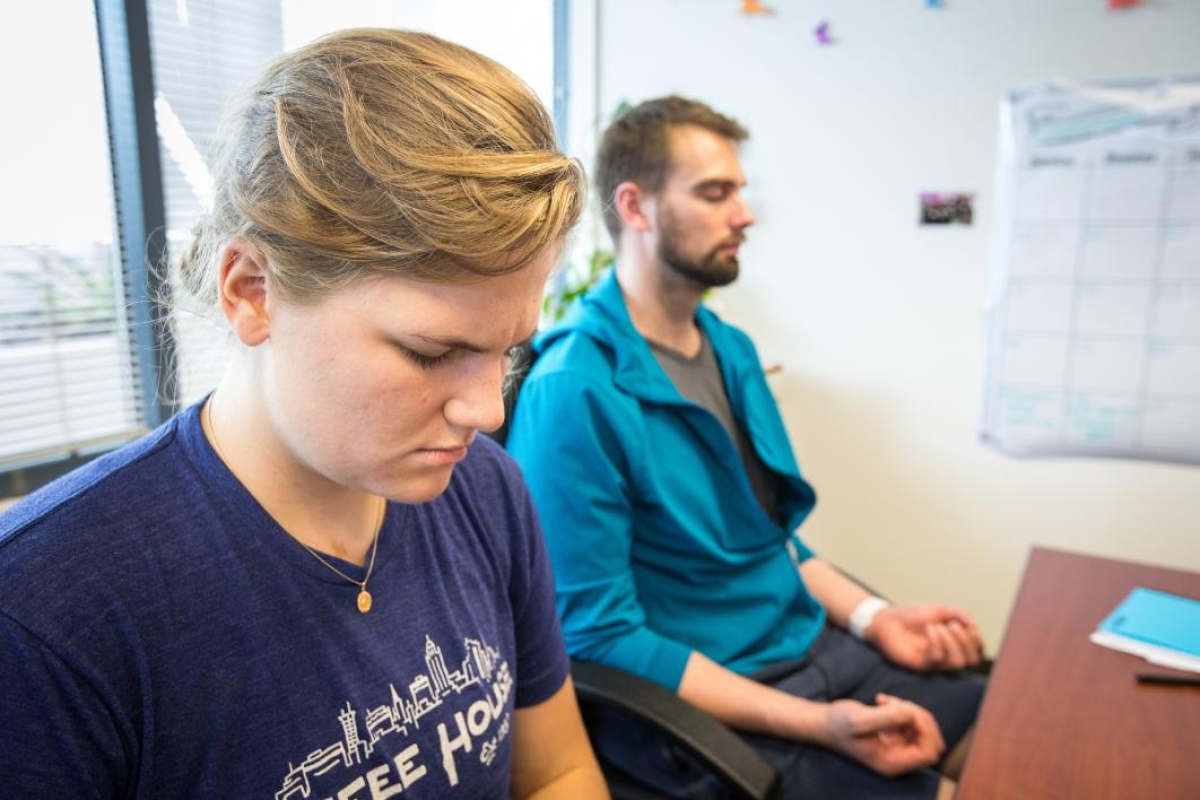It’s a Tuesday afternoon, and on the third floor of the Arizona Center in downtown Phoenix, a group of second-year Mayo Clinic students are learning to walk — or perhaps more accurately, re-learning to walk. This time, they're doing it mindfully.
Arranged in a circle in the large communal room at the offices of Arizona State University’s Center for Mindfulness, Compassion and Resilience, they move clockwise, each step slow and thoughtful, taking their direction from Angie Haskovec, alumni coordinator for the College of Nursing and Health Innovation, who stands just outside the circle, gently guiding them.
“Think about all the muscles that go into taking each step,” Haskovec says. “Notice all the sensations in your feet. The temperature, the texture of the carpet.”
The students listen, eyes trained on the floor beneath them as they continue in their silent march.
This is day two of a four-day selective course developed by the center specifically to introduce Mayo Clinic medical students to the concept of mindfulness and related practices so they can incorporate them into their schooling and later, their careers.
Haskovec is the instructor for today’s Koru Mindfulness lesson. Developed in the mid-'90s by two psychiatrists at Duke University, the Koru Mindfulness curriculum is geared toward students and young adults, applying such practices as breathing techniques, visualization exercises and guided meditations to the specific context and challenges of the college environment.
After the exercise, the students head back to the more intimate conference room, where the rest of the day’s lessons will take place, to reflect.
“I can see why it’s so hard to program a robot to walk,” said Ryan Smith. All joking aside, Smith reported that it forced him to quiet his mind and focus just on the present moment and what was happening in it. “All the little things involved in just taking a step is something you’re not typically conscious of in day-to-day life.”
Teri Pipe, ASU’s chief well-being officer and founding director of the Center for Mindfulness, said she particularly likes the mindful walking practice because it’s “sneaky” in that you can do it without anyone noticing, unlike other practices that might require you to sit down and close your eyes for several minutes or repeat a mantra aloud.
Pipe, who also serves as a research professor at CONHI, designed the four-day selective along with the center’s executive director for university engagement, Nika Gueci.
“Mindfulness practices,” Pipe said, can help those in the medical field to better deal with stressful situations, such as a patient dying, “by strengthening their disaster-preparedness beforehand, ensuring they have the skills to cope while the stress is occurring and afterwards, to regroup and rejuvenate so they’re ready to go back to work the next day and be a full person, and not get burnout or suffer from chronic fatigue of compassion.”
But as several ASU faculty can attest, the benefits of mindfulness extend to more than just medical students.
Barbara Crisp, an adjunct faculty member with The Design School, began teaching a mindfulness fundamentals course there a few semesters ago in which students hear from guest speakers and learn skills that range from breathing techniques to meditation to body scanning.
“I’m trying to give them a well-rounded approach to what mindfulness is and how it’s really important as a lifelong skill,” Crisp said.
During the second semester teaching the course, an error was made in the catalog that allowed students from any discipline to sign up.
But, Crisp said, “It was a lovely accident because when we get out of school, we work across all disciplines.”
Now, in addition to the mindfulness course she teaches for design students, Crisp teaches Koru Mindfulness classes to full-time graduate students at the W. P. Carey School of Business. She said students have reported benefits that include communicating better with their partner and performing better on tests and assignments.
“There is so much talk about excellence in academia, but without stillness (and) silence, we cannot build resilience nor can we access our innate wisdom,” Crisp said. “Resilience arises from silence — meaning you can bounce back from challenges and cultivate the ability to cope with whatever comes your way. And that silence also gives rise to our innate wisdom and the potential to achieve another level of excellence.”
School of Social Work faculty associate Jeffrey Woolley agrees that mindfulness is one of the best ways to work on yourself and achieve personal growth. A psychotherapist, Woolley became interested in the practice during his college years in the 1980s and has been formally practicing meditation for 31 years.
At ASU, Woolley teaches his social work students three mindfulness courses that make up part of the Integrative Health Certificate: “mindfulness and quality of life,” “treating the whole person” and “holistic therapies for modern living.”
“In our classes, we apply mindfulness directly to clinical rapport,” Woolley said. “It helps greatly in that regard by being present and open and receptive.”
All things that translate to exemplary communication, regardless of the nature of the relationship.
When Douglas Kelley, a professor of communication studies in the New College of Interdisciplinary Arts and Sciences, participated in couple's counseling, he realized that such mindful concepts as being present and aware of one’s feelings can better facilitate reconciliation and forgiveness.
Now Kelley regularly incorporates mindfulness into his classes and often asks students to try various techniques out at home. Once, he asked his students to engage in mindful listening during a conversation over the weekend, focusing on being present and nonjudgmental of what the other person was saying.
The following week, a previously skeptical student reported having used the technique while listening to his mom complain about his dad — something he’d usually just tune out — and came away with a deeper appreciation for her feelings and situation.
“I just wanted to grab him and hug him and say, ‘That’s it!’” Kelley recalled. But, he tempered, “the object isn’t to come away with a new insight, it’s simply to be. And that theme carries through my courses: the idea of transformation through presence. I believe that we’re transformed through being present with ourselves and each other in a nonjudgmental way.”
The existing recognition of mindfulness as a powerful life tool at ASU underscores the value of having a place like the Center for Mindfulness, Compassion and Resilience that can act as a hub for the emerging phenomenon.
Since its launch over a year ago, there have been several promising developments at the center, including a series of online health and wellness courses created in collaboration with Mayo Clinic and EdPlus.
And registration is now open for the center’s second annual conference, “Water and Stone: The Power of Mindfulness for Social Change,” which will take place Feb. 28 through March 1 as part of its Equitable Mindfulness Initiative, with Rhonda Magee of the University of San Francisco and Kamilah Majied of Howard University as keynote speakers.
Top photo: Second-year Mayo Clinic medical student Ryan Smith takes part in a meditation exercise as part of a four-day selective course offered by ASU's Center for Mindfulness, Compassion and Resilience. Photo by Charlie Leight/ASU Now
More Health and medicine

The science of sibling dynamics: Why we fight, how we relate and why it matters
We have Mother’s Day, Father’s Day and even Grandparents’ Day. But siblings? Usually they get a hand-me-down sweatshirt and, with any luck, a lifetime of inside jokes.But actually, there is a…

New study seeks to combat national kidney shortage, improve availability for organ transplants
Chronic kidney disease affects one in seven adults in the United States. For two in 1,000 Americans, this disease will advance to kidney failure.End-stage renal failure has two primary…

New initiative aims to make nursing degrees more accessible
Isabella Koklys is graduating in December, so she won’t be one of the students using the Edson College of Nursing and Health Innovation's mobile simulation unit that was launched Wednesday at Arizona…





